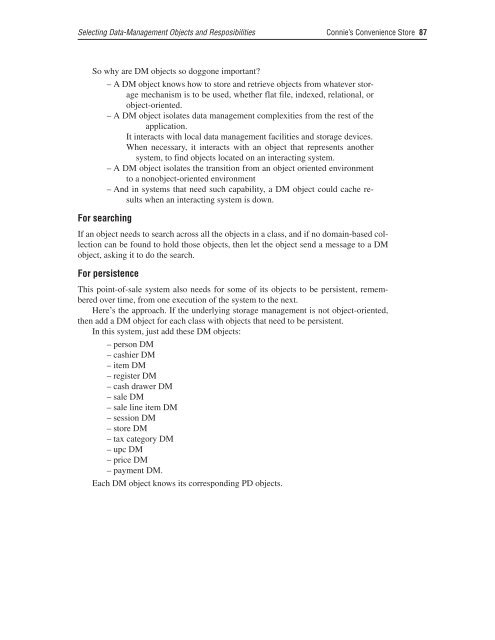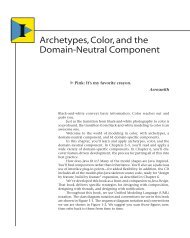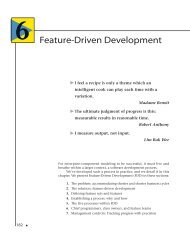Connie's Convenience Store - About Peter Coad
Connie's Convenience Store - About Peter Coad
Connie's Convenience Store - About Peter Coad
You also want an ePaper? Increase the reach of your titles
YUMPU automatically turns print PDFs into web optimized ePapers that Google loves.
Selecting Data-Management Objects and Resposibilities Connie’s <strong>Convenience</strong> <strong>Store</strong> 87<br />
So why are DM objects so doggone important?<br />
– A DM object knows how to store and retrieve objects from whatever storage<br />
mechanism is to be used, whether flat file, indexed, relational, or<br />
object-oriented.<br />
– A DM object isolates data management complexities from the rest of the<br />
application.<br />
It interacts with local data management facilities and storage devices.<br />
When necessary, it interacts with an object that represents another<br />
system, to find objects located on an interacting system.<br />
– A DM object isolates the transition from an object oriented environment<br />
to a nonobject-oriented environment<br />
– And in systems that need such capability, a DM object could cache results<br />
when an interacting system is down.<br />
For searching<br />
If an object needs to search across all the objects in a class, and if no domain-based collection<br />
can be found to hold those objects, then let the object send a message to a DM<br />
object, asking it to do the search.<br />
For persistence<br />
This point-of-sale system also needs for some of its objects to be persistent, remembered<br />
over time, from one execution of the system to the next.<br />
Here’s the approach. If the underlying storage management is not object-oriented,<br />
then add a DM object for each class with objects that need to be persistent.<br />
In this system, just add these DM objects:<br />
– person DM<br />
– cashier DM<br />
– item DM<br />
– register DM<br />
– cash drawer DM<br />
– sale DM<br />
– sale line item DM<br />
– session DM<br />
– store DM<br />
– tax category DM<br />
– upc DM<br />
– price DM<br />
– payment DM.<br />
Each DM object knows its corresponding PD objects.




